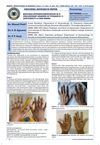 September 2023 in “Mağallaẗ baġdād li-l-ʿulūm”
September 2023 in “Mağallaẗ baġdād li-l-ʿulūm” Microbial communities in Duku plant roots vary between wet and dry habitats, affecting plant health.
 August 2023 in “Acta Scientific Veterinary Sciences”
August 2023 in “Acta Scientific Veterinary Sciences” Ivermectin, Vimeral syrup, and Benzyl Benzoate effectively treat sarcoptic mange in rabbits.
 May 2023 in “Current Applied Science and Technology”
May 2023 in “Current Applied Science and Technology” Higher power CO2 laser causes more severe skin burns and damage.

There are many treatments for common hair loss, but more trials are needed to decide which are best.
 March 2023 in “Journal of Veterinary Medicine and Animal Health”
March 2023 in “Journal of Veterinary Medicine and Animal Health” The fly larvae infestation caused severe skin damage and health issues in Kenyan dogs.
 January 2023 in “Discovery immunology”
January 2023 in “Discovery immunology” T cells and bacteria in the gut and skin help maintain health and protect against disease.
 January 2023 in “International journal of homoeopathic sciences”
January 2023 in “International journal of homoeopathic sciences” The document says homoeopathic treatments are good for hair regrowth in alopecia areata but doesn't give proof.
 November 2022 in “Gigascience”
November 2022 in “Gigascience” A specific genetic deletion in goats affects cashmere yield and thickness.
 October 2022 in “Journal for Research in Applied Sciences and Biotechnology”
October 2022 in “Journal for Research in Applied Sciences and Biotechnology” Certain changes in the SHBG gene may increase the risk of PCOS in Iraqi women.
 October 2022 in “Indian journal of anatomy and surgery of head, neck and brain”
October 2022 in “Indian journal of anatomy and surgery of head, neck and brain” The nasolabial flap is effective for repairing the mouth in patients with oral submucous fibrosis.
 October 2022 in “Research Square (Research Square)”
October 2022 in “Research Square (Research Square)” Key genes linked to immune response are highly active in lupus-affected hair follicles.
 August 2022 in “Revista de la Universidad Industrial de Santander/Salud UIS”
August 2022 in “Revista de la Universidad Industrial de Santander/Salud UIS” Stress-related hair loss was reversed with a special medication.
 June 2022 in “Veterinary evidence”
June 2022 in “Veterinary evidence” Clomipramine alone does not reduce overgrooming in cats with psychogenic alopecia.
 February 2022 in “International journal of KIU”
February 2022 in “International journal of KIU” Certain genes and nutrients like vitamin D, zinc, and omega fatty acids affect COVID-19 severity and infection risk.
 January 2022 in “International journal of zoology and animal biology”
January 2022 in “International journal of zoology and animal biology” Dogs with dermatomyositis, especially Collies and Shetland Sheepdogs, need better treatments for their skin and muscle inflammation.
 January 2022 in “Clinical dermatology open access journal”
January 2022 in “Clinical dermatology open access journal” Certain cannabinoids may help increase hair growth and could be useful for treating hair loss.
 July 2021 in “PARIPEX INDIAN JOURNAL OF RESEARCH”
July 2021 in “PARIPEX INDIAN JOURNAL OF RESEARCH” Knuckle darkening can be an early sign of vitamin B12 deficiency.
 January 2021 in “Journal of Allergy and Therapy”
January 2021 in “Journal of Allergy and Therapy” Electric Follicle Stimulation may promote hair growth and density with no known side effects.
 August 2020 in “Egyptian Veterinary Medical Society of Parasitology Journal (EVMSPJ)”
August 2020 in “Egyptian Veterinary Medical Society of Parasitology Journal (EVMSPJ)” 10.5% of sheep in Ismailia, Egypt, had Sarcoptes scabiei, causing skin issues.
 December 2018 in “DergiPark (Istanbul University)”
December 2018 in “DergiPark (Istanbul University)” The cat's skin condition improved with treatment, but underlying health issues must be addressed.
 June 2018 in “Journal of evolution of medical and dental sciences”
June 2018 in “Journal of evolution of medical and dental sciences” Skin problems like excessive hair growth, acne, and dark skin patches can be signs of Polycystic Ovarian Disease, which may also be linked to family history and a risk for diabetes.
 January 2018 in “Elsevier eBooks”
January 2018 in “Elsevier eBooks” The document concludes that alopecia has various forms, each with specific treatments, but no definitive cure for certain types like CCCA has been proven.
 September 2017 in “Springer eBooks”
September 2017 in “Springer eBooks” FUE hair transplants have improved to give more natural results with less scarring and pain.
 May 2017 in “InTech eBooks”
May 2017 in “InTech eBooks” Hair pulling disorder is treated with therapy and medication; hair loss from tension can be reversed if caught early.
 January 2017 in “SM dermatology journal”
January 2017 in “SM dermatology journal” Eyebrow hair transplants have high patient satisfaction and require surgeons to have artistic and technical skills.
 January 2016 in “Springer eBooks”
January 2016 in “Springer eBooks” The document concludes that there are various causes and treatments for hair loss, with hair transplantation being a notable option.
 January 2016 in “Georg Thieme Verlag eBooks”
January 2016 in “Georg Thieme Verlag eBooks” Hair transplantation in East Asians needs special techniques to ensure natural results and prevent complications due to their unique hair and scalp characteristics.

Modern hair restoration techniques can effectively treat hair loss and provide natural-looking results.
 June 2015 in “Biomedical and biopharmaceutical research”
June 2015 in “Biomedical and biopharmaceutical research” The congress showed advancements in skin hydration, barrier function, and safe, effective new cosmetic formulations.
 March 2015 in “Plastic and reconstructive surgery”
March 2015 in “Plastic and reconstructive surgery” Human skin has multiple layers and functions, with key roles in protection, temperature control, and appearance.





























